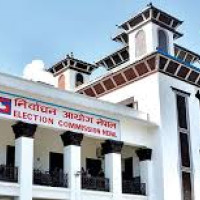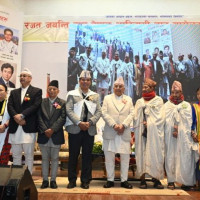- Monday, 9 February 2026
Organic waste management leads to economic, health benefits
Kathmandu, May 5: The Bagmati River Basin Improvement Project (BRBIP) has distributed more than 4,000 subsidised compost bins to the local households (5 per cent of the households in the Upper Bagmati Corridor) in the Kathmandu Metropolitan City, Gokarneshwor Municipality and Kageshwori-Manohora Municipality to promote organic waste management.
According to sanitation experts, if all the households use composting, at least eight tonnes of biodegradable waste can be managed per day at the lower Bagmati Corridor and 36 tonnes per day in the entire Kathmandu Valley.
A recent study conducted by BRBIP shows that the practice of composting at the household level has helped reduce biodegradable waste at the source which has numerous economic and health benefits.
The study found that the majority of households have started segregating biodegradable waste and opted for household composting after the BRBIP implemented social mobilisation and solid waste management components.
According to the study, 58 per cent of respondents were trained by the project activities through wards and local community organisations, while 27 per cent started these activities without training. The composting initiative has also helped reduce greenhouse gas emissions and the burden on landfills.
Based on the findings of the study, it can be concluded that the provision of subsidised compost bins and waste management training has resulted in positive changes in waste management practices at the household level.
"The use of composting as a method of managing organic waste has several benefits, including reducing the burden on landfills, reducing greenhouse gas emissions, generating organic manure for urban farming or rooftop gardening, and promoting an environmentally conscious lifestyle," said Dhundi Raj Pathak, an expert in solid waste management.
In addition, the study highlights the importance of community involvement in waste management initiatives. The active participation of municipalities, NGOs, CBOs, local clubs, and women or youth groups, along with the provision of adequate knowledge, facilities, and tools have helped promote composting practices leading to an environmentally conscious lifestyle.
According to Pathak, who is the lead researcher of “Study on Impact of Household Compost Bin”, the municipalities in the Kathmandu Valley spend a significant amount of money on managing solid waste, and the use of composting could potentially reduce these costs while also helping in the production of organic manure to use in urban farming or rooftop gardening.” He suggested that the cost savings from managing biodegradable waste at the source through composting could be substantial. "It is great to see that the communities along the Bagmati Corridor are aware of the importance of waste management and the negative impacts of haphazard dumping of waste," said Pathak.
Based on the survey findings, the study also recommends several actions to improve the solid waste management system in the area, such as regular and scheduled collection of waste can help reduce the accumulation of waste and prevent the overflowing of bins, which can attract pests and cause health hazards.
"Separate collection of degradable and non-degradable waste can also help manage waste more efficiently and facilitate the recycling of materials," the study suggests.
“Developing and implementing integrated waste management policies, laws and strategies can provide a framework for effective waste management. Investing in solid waste management infrastructure, such as composting facilities and recycling plants, can also help to recover both organic and dry recyclables on community and municipal scale, depending on the nature and scale of the city,” Pathak said.
Conducting awareness-generating programmes, campaigns, mobilisation, and media outreach can help raise awareness, ownership, and responsibility among stakeholders, including the local community and households themselves is important.
These actions can contribute to improving the solid waste management system along the Bagmati Corridor and preventing solid waste from reaching the Bagmati River, Pathak said. According to him, it is also necessary to provide training and technical assistance to households and businesses to improve their waste management practices, he said.
Increasing the number and accessibility of waste collection sites, particularly in the areas with high population densities or where illegal dumping is common, and encouraging the development of private sector initiatives to manage waste, such as recycling and waste-to-energy programmes, could also be important steps for waste management.
Pathak also suggested developing and implementing policies and regulations to ensure that waste is properly disposed of and that polluters are held accountable. He also said that increasing the use of modern waste management technologies, such as composting, recycling, and waste-to-energy, to reduce the amount of waste that is sent to landfills is needed to address the current problem in waste management.
Promote the development of green spaces, such as parks and urban forests, to absorb carbon emissions and improve the quality of life for residents. Encouraging the development of sustainable agriculture practices, such as organic farming and integrated pest management, to reduce the use of chemical fertilizers and pesticides is needed to address the problem.

















